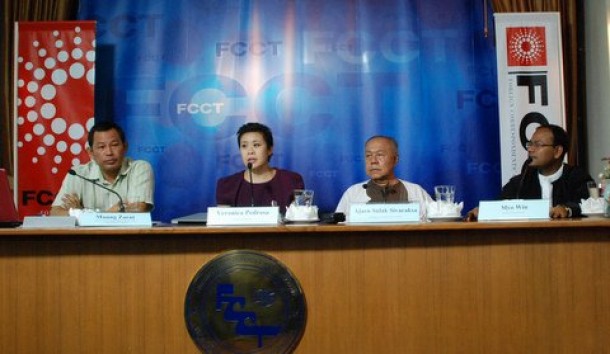The Burmese government is conducting a concerted campaign of genocide against its Muslim minorities, with Buddhist monks and the state collaborating in violent anti-Muslim attacks, the academic and activist Maung Zarni said during a panel discussion at the Foreign Correspondents’ Club of Thailand (FCCT) in Bangkok on Thursday.
“It’s nothing short of genocide,” he said. “Genocide is a process that unfolds; it’s a virus that spreads quickly into a contagion that cannot be stopped. What has happened in Burma in the last two years is evil, vile and depraved,” he said.
The genocide in Burma is now on the scale of Pol Pot’s Cambodia, he added. “And it won’t stop until all the country’s Muslims and Rohingyas are eliminated.”
These are challenging times, Burmese Muslim leader Myo Win said. He runs an education NGO called Smile in Rangoon, and came from Burma especially to attend the seminar to provide first-hand testimony of the situation facing Muslims in Burma.
“It’s not a communal or sectarian conflict, it’s a one-sided, targeted and often deadly attack against Muslims, under the purview of state authorities,” he said. “Community leaders are spreading hostility and hate against Muslims, through the distribution of pamphlets and propaganda …verbal abuse, harassment and violence,” he explained.
Inside Burma there is a state of fear among the country’s Muslims, he said. The violence against the Rohingyas in Arakan last year and then the attacks on Muslims in central Burma have left most Muslim communities feeling vulnerable and scared.
But according to eye-witnesses inside Burma, the Muslim community has begun to fight back. Barricades have been set up near the Muslim quarters in Rangoon and citizen patrols are being conducted.
The Thai Buddhist social activist Sulak Sivarksa was much more measured in his comments, but drew a stark comparison between the role of monks involved in the 2007 Saffron Revolution and those in the Buddhist nationalist 969 movement. The monks in the 2007 uprising were willing to lose their lives for the good of society, he said, but the 969 monks are spreading hate.
The monks behind the 969 movement say they are reminding Buddhists of their core values and draw comparisons with Afghanistan, Bangladesh, Indonesia and Malaysia, which they say were originally Buddhist countries that were overrun by Islamists.
“Fear is the source of many problems in any society,” said Sulak. And with Burma’s transition to democracy, and the increase in freedom that has accompanied it, traditional prejudices and unruliness have inevitably risen to the fore, he added.
The teachings of Buddha are very clear, he said: You can never harm anyone, but first you cannot harm yourself. A Buddhist must overcome fear, must learn to love, even the oppressors, and never stoop to violence. “Buddhism and nationalism are incompatible,” he said. “Nationalism is an extension of selfishness…not to be tolerated or condoned.”
Buddhists must have compassion; they cannot be quiet and sit on the fence, they cannot turn a blind eye, said Sulak. But this is exactly what is happening in Burma today, stressed Myo Win.
“The state’s silence and inaction has been deplorable,” he said. They are responsible for the safety and security of the Muslims, but instead they seem to be complicit in the pogroms, he added.
Those involved in the violence have not been arrested, and their campaign against Muslims has been allowed to continue unhindered. They are puppets of a bigger master, he suggested.
During the panel discussion, reference was made to President Thein Sein’s televised speech to the nation, in which he insisted that the government would take preventative measures and increase security and that all Muslims would be protected and allowed to worship freely.
But Zarni simply dismissed the president’s pledges as worthless. “Thein Sein is a world-class liar,” he stormed.
He was also critical of opposition leader Aung San Suu Kyi, who he accused of “thunderous silence” on the issue of sectarian violence.

















